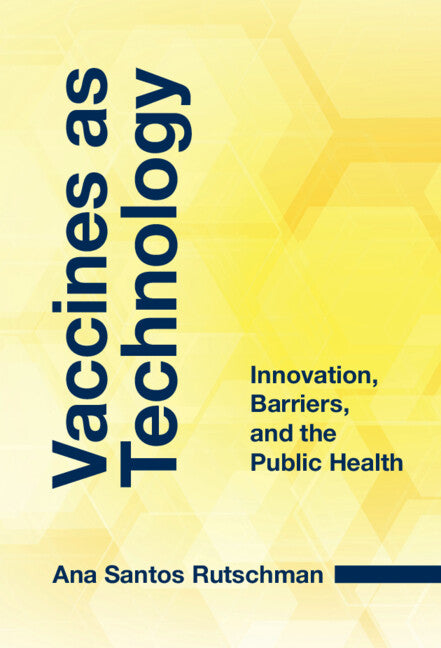Freshly Printed - allow 8 days lead
Couldn't load pickup availability
Vaccines as Technology
Innovation, Barriers, and the Public Health
Examines the development and allocation of vaccines against emerging diseases from the viewpoint of technology and innovation policy.
Ana Santos Rutschman (Author)
9781009123396, Cambridge University Press
Hardback, published 14 April 2022
250 pages
23.5 x 15.8 x 1.7 cm, 0.43 kg
'Although vaccines prevent more deaths and misery than any other biomedical intervention, as a pharmaceutical product they are uniquely difficult to develop, produce and distribute. To protect the public health, vaccines must be inexpensive enough to protect billions yet efficient enough to be administered only a few times in a lifetime, rendering them less appealing to investors than expensive treatments for chronic illness. In addition, vaccines are difficult to make safely and are a hard sell to healthy people in the face of growing disinformation. Ana Santos Rutschman provides an extremely helpful, comprehensive and timely explanation of these paradoxical challenges, updated with the story of the Covid-19 vaccines and suggestions for paths toward more stability in the vaccine enterprise.' Arthur Allen, Reporter and Editor, Kaiser Health News, Author, Vaccine: the controversial story of medicine's greatest lifesaver (WW Norton); The Fantastic Laboratory of Dr. Weigl (WW Norton)
The COVID-19 pandemic served as a powerful wake-up call, highlighting our collective need for the effective development and equitable distribution of new vaccines, in addition to widespread administration of existing ones. The current models of production and allocation of vaccines against emerging pathogens, which rely on predominantly market-driven mechanisms, are largely at odds with public health needs. This book is the first to explore the entire arc of vaccine development and distribution, from the decisions about allocation of vaccine R&D money to allocation and administration of vaccines resulting from the R&D process. It explains key concepts and problems in vaccine regulation, intellectual property, technology transfer, and international relations, making complex material accessible to a non-specialist audience. Analyzing the impact of COVID-19, the book also covers several other vaccine races, as well as future directions in vaccine development and allocation.
Introduction
1. Vaccines as instruments of public health
2. The vaccine development ecosystem
3. Vaccine development under proprietary paradigms
4. Access to vaccine technology
5. Aligning vaccine innovation with public health needs
6. Vaccines of the future: present and emerging challenges
Conclusion: broader implications for global public health.
Subject Areas: Immunology [MJCM], Public health & preventive medicine [MBN], Medical & healthcare law [LNTM], Ethical issues: scientific & technological developments [JFMG]


